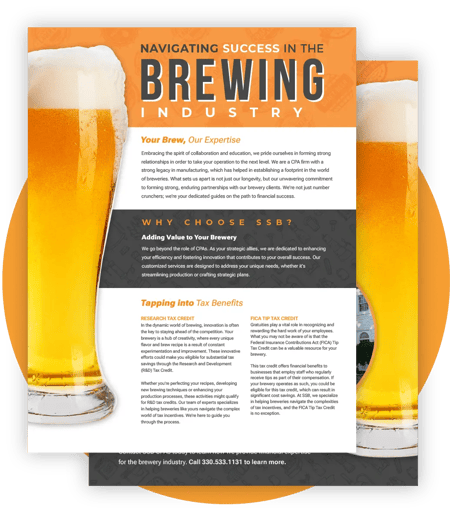5 min read
Take Advantage of SIMPLE-IRA Catch-Up Contributions
If you participate in a SIMPLE-IRA and are age 50 or older, you can make so-called catch-up contributions that are...

The craft brewing industry continues to grow, and today’s brewers face many unique and difficult challenges: inventory control, research and development, overhead allocation and developing pricing strategies.
The industry requires the owners to have good working relationships with financing sources, to be innovative and receptive to new brewing techniques, and to have a thorough grasp of cost accounting principles.

The industry is highly regulated and requires owners to maintain detailed accounting records. Periodic and annual filings are required by federal and state law. In order to be successful, today’s brewery owner must be capable of wearing many hats.
Recommendations to improve working capital to help increase financing capacities
Evaluation, development and installation of accounting systems
Budgets and projections
Financial statements according to present industry standards
Coordination of business and personal tax planning
Income and cost recognition methods
Multistate issues—nexus, sales and use tax, franchise, income and other taxes
Structuring of business entities
Specialized deduction and credit opportunities, such as research and development credits
Business continuation and succession planning
Analysis of potential acquisitions and mergers

Independent brewers made up 13.1% of the U.S. beer market in 2022.
There were more than 9,500 breweries in the United States in 2021, and openings outpaced closings, with 550 opening and 200 shutting down, according to the Brewers Association.
Breweries face unique challenges that other small businesses don’t have to worry about. Our CPAs understand what you’re dealing with daily and have the practical know-how to help. Breweries have significant upfront costs for purchases, including buildings, equipment and durable flooring. Additionally, business owners struggle with inventory management and distribution as well as cash flow and staff. With our specialized experience, we can help you negotiate these challenges.
Brewery owners have complicated tax requirements to worry about, which adds extra complexity to running an already challenging business. But with our help, tax time can be less stressful. We are specialists in tax and accounting for breweries, which means we have the experience, knowledge and expertise to address every tax-related scenario. Whether it’s federal, state, sales or TTB taxes, we’ll ensure your brewery is compliant will all relevant tax requirements.
Payroll is another key challenge for brewery owners to monitor. For any business with staff, payroll can be a nightmare. But if you don’t correctly track payroll, it could be very consequential. That’s why it’s important to get help from an experienced professional who understands your business. Our team has experience working with several large payroll providers. We can assist with ensuring your payroll is set up correctly and help integrate your payroll transactions with your accounting system.
Our brewery CPAs have extensive knowledge of tax requirements alongside insightful beverage industry awareness to add value to breweries. From research and development tax credits to cost segregation studies, we are committed to finding ways to help you reach your goals.
Because the operations of a brewery present several unique issues, our CPAs have addressed those pain points by becoming experts in:
• Creating a brewery-specific chart of accounts
• Calculating the cost of beer
• Supplying profitability reports and financial statements
Because of the unique accounting needs required of a brewery CPA, it is crucial to work with accountants that have years of experience in the industry.
Our brewery consultants are members of the Brewers Association, Ohio Craft Brewers Association and the State Line Brewers Guild. They have also shared their expertise by presenting on various topics at both in-person and virtual events.
5 min read
Feb 20, 2026
If you participate in a SIMPLE-IRA and are age 50 or older, you can make so-called catch-up contributions that are...
7 min read
Feb 18, 2026
The One Big Beautiful Bill Act (OBBBA) included favorable changes to the federal income tax rules for depreciating...